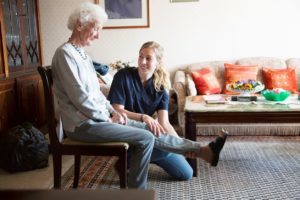 A healthy lifestyle that includes exercise and fitness is highly emphasized in today’s society, but when it comes to frail older adults, senior exercise and fitness are not necessarily health topics that come readily to mind. However, the benefits of even moderate exercise for seniors are so great that it should not be overlooked. Recent studies suggest that senior citizens who exercise – even if they didn’t exercise when younger – tend to live longer, healthier, happier lives. This is due in no small part to a renewed or strengthened ability to perform daily activities independently and better fight through illnesses.
A healthy lifestyle that includes exercise and fitness is highly emphasized in today’s society, but when it comes to frail older adults, senior exercise and fitness are not necessarily health topics that come readily to mind. However, the benefits of even moderate exercise for seniors are so great that it should not be overlooked. Recent studies suggest that senior citizens who exercise – even if they didn’t exercise when younger – tend to live longer, healthier, happier lives. This is due in no small part to a renewed or strengthened ability to perform daily activities independently and better fight through illnesses.
While some physical weakness may be a part of the natural aging process, functional decline is often the result of a sedentary lifestyle. The National Institute on Aging released startling statistics after a physical health study performed on elderly aged 75 and older that demonstrated the desperate need to improve the fitness health of frail seniors. The study revealed that 40 percent of the seniors studied could not walk two blocks; 32 percent could not climb 10 steps; 22 percent could not lift 10 pounds; and 7 percent could not walk across a small room.
There are some common misconceptions about physical activity and older adults. For example, the myth that frail adults are unable to exercise, or it’s not wise or safe to start an exercise program, or that there are no benefits that the frail elderly can gain from fitness. While it is always important to consult a physician before starting a new exercise regiment, the truth is that debilitation can oftentimes be minimized with regular exercise.
Besides the obvious benefit of increasing muscular strength and endurance which deteriorate through inactivity, the Office of Aging, U.S. Department of Health and Human Services note that fitness can effectively produce many physiological benefits, including improving circulation to reduce high blood pressure, improving joint flexibility and range of motion, and improving respiratory ability and efficiency.
Exercise can help to prevent falls and fractured hips in the elderly. This is especially significant because 50 percent of seniors who fracture a hip never walk independently again, and many die from complications. Exercise also can fight the effects of brittle bones from osteoporosis by strengthening bone mass. Additionally, resistance training can increase strength in the knees and ankles, which will also help to prevent falls.
Exercise encourages a healthy digestive system. Regular activity naturally increases a poor appetite, which is a common problem with inactive seniors. Healthier appetites lead to healthier eating habits. Healthier eating habits lead to alleviation of digestive and bowel function issues common among the elderly, which in turn helps with sleeping difficulties.
Susceptibility to illness greatly increases with age; thus, a particularly important benefit of exercise for the frail elderly is an increased ability to fight off illness. Stress can deplete a senior’s natural ability to ward off sickness; however, exercise improves the autonomic nervous system’s ability to tolerate stress. Exercise can also enhance the immune system with a significant increase in serum immunoglobulin.
In addition to its physiological benefits, there are also many psychological benefits of exercise for the elderly. Exercise helps the elderly maintain a sense of autonomy over their aging bodies. Instead of feeling like victims to the aging process, they can take control with a regular exercise program and make progressive steps towards improving their physical health. Exercise has also been shown to channel energies into healthy and productive activity, which helps to reduce anxiety and tension and fight depression, as well as alleviate frustration, loneliness and hopelessness. Furthermore, it produces an increased sense of independence, which helps to foster self-esteem.
There is also evidence that exercise produces an enhancement of cognitive abilities. Improving circulation increases the amount of oxygen brought to the brain, enhancing mental alertness. Studies have also shown that non-strenuous physical exercise can help the elderly improve memory retrieval and visual-motor performance.
To receive these numerous benefits of exercise for the frail elderly, it does not take a large time commitment. The initial frequency of an exercise routine can be as short as 6 minutes, repeated throughout the day. Documented benefits in frail elders have resulted from as little as 30 cumulative minutes of exercise a week! The real commitment comes with a mental pledge to “keep at it.” Creating a routine for specific exercise times each day helps foster a longer-term commitment to the exercises.
Incorporating moderate activity and senior exercise into daily routine can be a challenge for some frail older adults, but there are many available resources to help with this important part of care. As the leaders of in home care that Wellington families trust, Aker Kasten Home Health Care provides caregivers who understand how to work gently with seniors to encourage activities that help regain strength. For more information about encouraging senior exercise and activity for the elderly in Wellington or anywhere in Palm Beach County, please contact Aker Kasten Home Health Care
